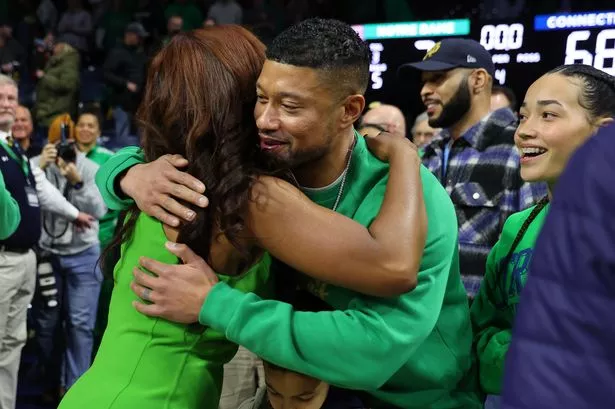Marcus Freeman, the head football coach at Notre Dame, has garnered significant praise and respect for the way he has handled various challenges and leadership moments throughout his coaching career. One of the most recent examples of his character came when he publicly reached out to Notre Dame women’s basketball coach Niele Ivey, sending a heartfelt message following a deeply emotional moment. This act revealed a side of Freeman that many may not have fully appreciated before, further solidifying his reputation as not only a great coach but also a compassionate leader.
Niele Ivey, who has been the head coach of Notre Dame’s women’s basketball team since 2020, faced significant personal and professional challenges during her tenure, including the pressure to continue the program’s storied success while dealing with difficult personal losses. Freeman’s message to her, sent after a particularly trying period for Ivey, was a testament to the support and camaraderie that exists within the Notre Dame athletic department. His note expressed both empathy and encouragement, offering a reminder that the strength of the Notre Dame community transcends any one sport and that they are all part of something much bigger than themselves.
This message stood out not only because of the emotional depth behind it, but also because it highlighted a key aspect of Freeman’s leadership style: his ability to connect with others on a personal level. While many would expect a football coach to be focused primarily on his own team, Freeman’s outreach demonstrated that he sees his role as one of a broader leader within the Notre Dame community. The university, with its rich traditions of excellence in both academics and athletics, thrives on a sense of unity and support. Freeman’s gesture reinforced this, showing that his leadership extends beyond the football field.
In his message, Freeman emphasized resilience and perseverance, two qualities that are crucial for any leader to instill in their team. He recognized the heavy burden Ivey had been carrying but also reminded her of the strength she possesses. This was not a message of hollow words, but one from a place of understanding, recognizing the deep challenges Ivey faced. Freeman’s own journey as a head coach had been filled with its own ups and downs, and his message reflected the wisdom he had gained from overcoming adversity in his personal and professional life. It is clear that Freeman’s character is shaped not only by his successes but also by how he navigates hardships, both his own and those of others.
Moreover, Freeman’s gesture highlighted the importance of fostering an inclusive and supportive culture within a university’s athletic program. At Notre Dame, excellence is expected from all sports programs, but the pressure to maintain that excellence can be intense. It is in times of struggle that a leader’s true character is revealed, and Freeman’s outreach to Ivey illustrated that his leadership is rooted in the belief that supporting one another is just as important as competing for championships.
This public display of support was also a reminder of the power of positive leadership. Coaches like Freeman understand that their roles are not just about teaching athletes how to play a game but also about shaping them into individuals who can handle life’s challenges with grace and resilience. His message to Ivey was a powerful example of how leaders in sports can use their platform to build relationships that extend far beyond the confines of their own teams.
In conclusion, Marcus Freeman’s message to Niele Ivey revealed much about his true character as a leader and a person. In a world where the focus is often placed on wins, losses, and statistics, Freeman’s gesture was a refreshing reminder of what true leadership looks like: it is about empathy, encouragement, and offering support when it is needed most. Through this act, Freeman reinforced the importance of community, both in sports and in life, and demonstrated that the legacy he is building at Notre Dame goes beyond wins on the football field. It is a legacy of compassion, support, and strength—qualities that will inspire those who work with him for yea
rs to come.
